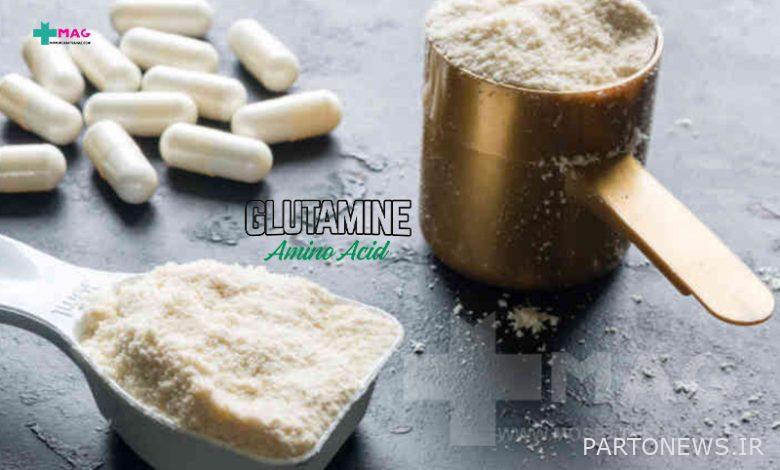What are the benefits of glutamine for the body?

Glutamine is one of the most abundant amino acids in the human body and is involved in many functions. Amino acids are the building blocks of protein in the body and are therefore essential for bodybuilders’ muscle growth. The human body is naturally able to make glutamine. You can also get this amino acid for your body by eating food or buying glutamine as a sports supplement. By reading this article, you will learn more about the benefits of glutamine for the body.
What we read in this article
What is glutamine?
Glutamine is one of the 20 amino acids that the human body needs to make protein. There are generally two types of glutamine: L-glutamine and d-glutamine. The two are similar but have different molecular arrangements. The form of glutamine that our body needs and that you can find in foods and supplements is L-glutamine, which is usually known only as glutamine. D-glutamine is generally of little use. The human body can make L-glutamine on its own, but in many cases it is necessary to provide this amino acid to the body through the use of bodybuilding supplements. Some illnesses and injuries cause the body to fail to produce glutamine, resulting in a deficiency of this amino acid.
The most important benefits of glutamine for the body
The properties of glutamine should be divided into 2 categories. One for bodybuilding and the other to help keep the body healthy:
Properties of glutamine in bodybuilding
For bodybuilders and professional athletes, glutamine supplementation has the following benefits:
Glutamine-assisted muscle building
The effect of glutamine supplementation on muscle building has been studied in several studies. A small study in 2001 found that young people who took glutamine or placebo for six weeks were no different in terms of strength and increased muscle mass. In other words, glutamine consumption had no significant effect on muscle building. However, some other research has shown that glutamine supplements may reduce muscle soreness or speed up recovery. To reduce fatigue after exercise, taking glutamine along with carbohydrates is also a good option. There is no conclusive evidence that glutamine is 100% effective in building muscle mass. But many athletes based on experience believe that glutamine has played a positive role in building muscle.
The effect of glutamine on improving athletic performance
More research is needed on the benefits of glutamine for improving athletic performance, as well as its effect on bodybuilding. A small study of 12 professional basketball players found that after 40 days, the group that took glutamine had less muscle damage than people who took a placebo, and their levels of the hormone cortisol (stress-related) were lower. This helps to repair the muscles during recovery and improves athletic performance.

Weight loss with glutamine
A systematic review and meta-analysis in 2019 showed that glutamine supplementation has a significant effect on weight loss in athletes. But in the same year, another study showed that glutamine reduced waist circumference in overweight or obese people but did not change body weight or BMI. Therefore, more research is needed in this area.
Health benefits of glutamine
Related Posts
Except in bodybuilding, glutamine is used in other cases:
Strengthen the immune system by providing glutamine
Glutamine can be used to keep the immune system strong. This amino acid increases white blood cells and helps the body become more resistant to pathogens and infections. According to a study conducted in 2018, the immune system needs more glutamine in the face of any injury or infection. If you can not get the amount of glutamine your body needs, the body breaks down its protein stores, ie muscles, and muscle breakdown takes place. In this case, the lack of glutamine in the body increases and the immune system may be compromised. People with severe injuries such as burns are advised to increase their glutamine-rich protein stores in their diet.
The effect of glutamine on intestinal health
The gut plays an important role in the health of the immune system. Therefore, all the benefits of glutamine for the immune system are related to intestinal health. A 2017 study found that glutamine in the gastrointestinal tract helps with the following:
- Control of various intestinal diseases
- Increased number of cells in intestinal tissue
- Elimination of inflammatory signals
- Protect cells for survival
In fact, without adequate amounts of glutamine in the body, the risk of gastrointestinal diseases such as inflammatory bowel disease (IBD), irritable bowel syndrome (IBS) and celiac disease may increase.
Natural sources for glutamine supply
In order to enjoy the properties of glutamine, you can also supply this amino acid to the body by eating foods. In the table below you can see what percentage of each of the following protein-rich foods contains Glutamine:
| Food month | Percentage of glutamine |
| egg | 4.4 percent equals 0.6 grams per 100 grams |
| Beef | 4.8% (1.2 grams per 100 grams) |
| Skim milk | 8.1% (0.3 g per 100 g) |
| توفو | 9.1% (0.6 g per 100 g) |
| White rice | 11.1% (0.3 g per 100 g) |
| Corn | 16.2% (0.4 g per 100 g) |
You can also find good amounts of glutamine in whole grains.

Dosage of glutamine per day
There is no recommended dose for daily glutamine intake. But research shows that consuming 20 to 30 grams of glutamine a day often does not cause any problems. But a 2013 study found that glutamine doses, if around 40 grams per day, could cause side effects. We do not recommend long-term use of glutamine supplements. If you want to know the exact amount of consumption, it is better to consult a doctor.
Side effects of glutamine supplementation
We enumerated the benefits of glutamine. In the usual and recommended amounts, often no side effects have been reported when taking glutamine supplements. The following side effects may occur if you take too much glutamine for too long:
- Increased production of ammonia in the body (leads to kidney and liver problems)
- Negative effect on the absorption of other amino acids
- Negative effect on immune system function
- Increased risk of malignant and cancerous tumors
- Digestive disorders
last word
Eating protein foods increases the body’s glutamine stores and gives you the benefits or benefits of glutamine. Glutamine is one of the most abundant amino acids in the body, which is involved in strengthening the immune system, maintaining intestinal health and improving the athletic performance of bodybuilders and athletes. As a source of glutamine, you can also use a glutamine supplement available at the pharmacy. This supplement often has no side effects if used in the recommended doses.
Please rate this article
[مجموع: ۱ میانگین: ۵]


